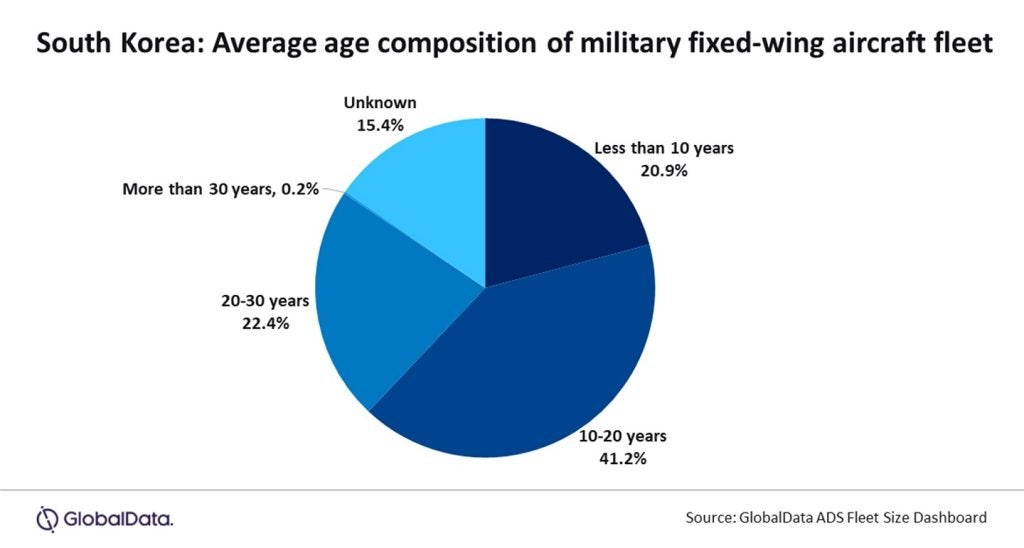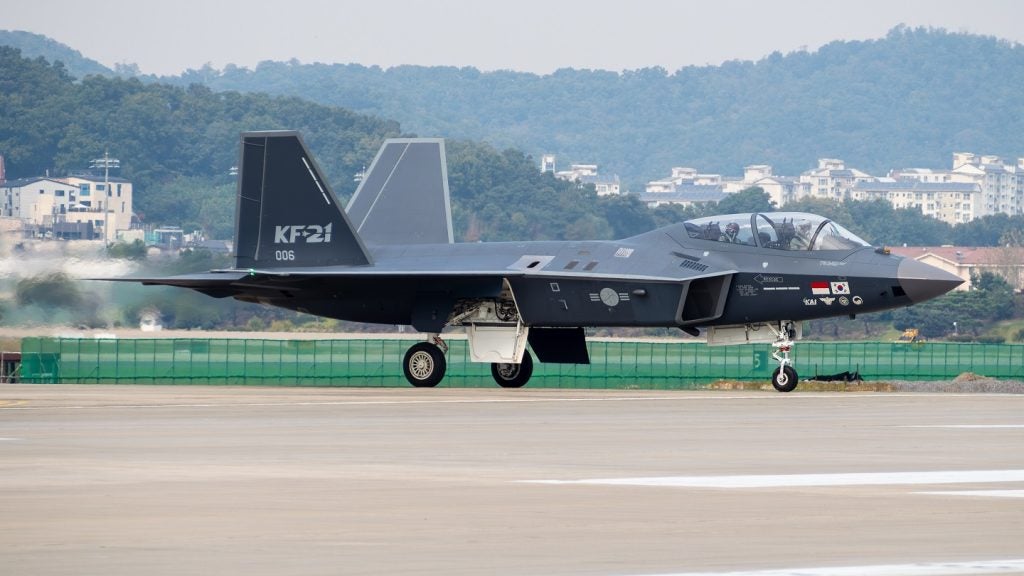With the green light to produce 20 KF-21 Boramae fighter aircraft, South Korea is poised to fortify its defence while tapping into defence export markets.
In a move to bolster its future defence capabilities, South Korea has recently received approval for the production of 20 KF-21 Boramae fighter aircraft. This decision is a leap forward in the nation's defence strategy and reveals a concerted effort within South Korea's indigenous defence manufacturing.
Export potential unlocked: Implications of KF-21 production approval
According to leading data and analytics company GlobalData, the approval of KF-21 production is poised to unlock a myriad of defence export opportunities for South Korea, positioning the nation as a strong player in the global defence market.
GlobalData's intelligence on the South Korean defence market highlights that the South Korean Air Force will get 40 KF-21s by 2028, and 80 more jets will be put into service by 2032, according to the president of Korea.
GlobalData's latest analysis, the "Fleet Size Dashboard," sheds light on the impact of the KF-21 production approval on South Korea's defence landscape. With 84% of fixed-wing aircraft in the South Korean Air Force inventory being relatively new, the induction of KF-21s is expected to further rejuvenate the fleet, phasing out older equipment and enhancing operational readiness.
Moreover, as approximately 20% of South Korea's fixed-wing fleet is domestically produced, the KF-21 production approval is set to augment the nation's indigenous defence manufacturing capabilities, reducing dependency on foreign suppliers.

Harpreet Sidhu, aerospace and defence analyst at GlobalData, underscores the significance of the KF-21 production initiation, "The initiation of production of the KF-21 will mark a significant stride in South Korea's indigenous defence manufacturing, positioning it as one of the few countries in the Asia-Pacific (APAC) region to design and deploy stealth fighters."
Beyond its immediate defence implications, the government's emphasis on indigenous defence manufacturing holds broader economic ramifications. South Korea aims to stimulate economic growth and generate employment opportunities by fostering a domestic defence supply-chain infrastructure.
Collaborations and deals: South Korea's defence partnerships
South Korea allocated about 29.7% of its 2023 defence budget to the acquisition or development of technologically advanced defence infrastructure, according to GlobalData's "South Korea Defense Market 2023-2028" report, to support the development of its indigenous manufacturing capabilities.
Despite this goal of reducing import dependency, South Korea typically relies on allies to fortify its defence capabilities. This year, US-based Pratt & Whitney, in collaboration with South Korea, signed a $355m deal to sustain F-15 Eagles and F-16 Fighting Falcons.
Concurrently, the South Korean Navy expanded its drone fleet with the CAMCOPTER S-300, procuring the unmanned air system from the Vienna-based Schiebel Group. Additionally, South Korea secured approval from the US for the acquisition of Subsonic Sea-Skimming Aerial Targets (SSAT) for its KDX-III Batch-II AEGIS destroyers.
Sidhu emphasises that amidst persistent threats from its northern neighbour, South Korea's overarching goal remains twofold, "Facing persistent threats from its northern neighbour, South Korea's overarching goal is to protect its sovereign territory while building up its own defence manufacturing capabilities.
By reducing reliance on foreign suppliers, the country aims to ensure effective maintenance and higher availability of KF-21 throughout its operational life. This plan will not only promote self-reliance in the defence sector but will also open opportunities for exports to friendly nations."
Long-term vision: Self-reliance in defence sector and export opportunities
As national armed forces worldwide transition towards preparing for potential high-intensity conflicts, South Korea's defence industry emerges as a global player in affordable modernisation efforts.
Benefiting from partnerships and US technology transfers, South Korea leverages its expertise to meet growing demand, particularly in the Asia-Pacific region. Contracts with countries like the Philippines, Thailand, India, Vietnam, and Australia highlight South Korea's expanding presence.
Despite geopolitical risks and ethical concerns, South Korea's defence industry thrives, propelled by government support and a growing global market demand for reliable technology.
South Korea received multiple defence orders outlined in the 2022 Poland-South Korea framework agreement. Under the agreement, Poland planned to acquire military equipment from South Korea, including K2 Black Panther Main Battle Tanks, K9 Self-Propelled Howitzers, FA-50 light attack aircraft, and K239 Chunmoo MLRS systems.









